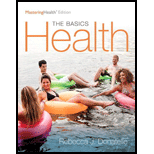
Health: The Basics, The Mastering Health Edition (12th Edition)
12th Edition
ISBN: 9780134183268
Author: Rebecca J. Donatelle
Publisher: PEARSON
expand_more
expand_more
format_list_bulleted
Concept explainers
Question
Chapter 4, Problem 3TAI
Summary Introduction
To Discuss: The reasons on why people develop into violent or abusive adults and other become pacifists or peaceful adults and the key factors that influence violent offender to be violent.
Introduction: Violence is an action of doing something of physical power that causes or is deliberate to cause damage. The harm inflict by violence may be bodily, psychosomatic, or both. Violence may be illustrious from anger, a more common type of aggressive behaviour that may be bodily, oral, or intolerant in nature.
Expert Solution & Answer
Want to see the full answer?
Check out a sample textbook solution
Chapter 4 Solutions
Health: The Basics, The Mastering Health Edition (12th Edition)
Ch. 4 - Prob. 1WDYTCh. 4 - Prob. 2WDYTCh. 4 - What could be done to reduce risk from this...Ch. 4 - Prob. 4WDYTCh. 4 - Prob. 5WDYTCh. 4 - Are there instances in which restricting the...Ch. 4 - Prob. 7WDYTCh. 4 - Prob. 8WDYTCh. 4 - Prob. 9WDYTCh. 4 - is an example of an intentional injury. a. A car...
Ch. 4 - Prob. 2PQCh. 4 - Which of the following is not a common explanation...Ch. 4 - Prob. 4PQCh. 4 - Prob. 5PQCh. 4 - Prob. 6PQCh. 4 - Prob. 7PQCh. 4 - Prob. 8PQCh. 4 - Prob. 9PQCh. 4 - What is the leading cause of death for persons...Ch. 4 - What forms of violence do you think are most...Ch. 4 - What type of violence is most common on your...Ch. 4 - Prob. 3TAICh. 4 - Prob. 4TAICh. 4 - Prob. 5TAICh. 4 - Prob. 6TAICh. 4 - Is your campus safe? What steps has your campus...Ch. 4 - Prob. 8TAI
Knowledge Booster
Learn more about
Need a deep-dive on the concept behind this application? Look no further. Learn more about this topic, health-nutrition and related others by exploring similar questions and additional content below.Recommended textbooks for you
 Comprehensive Medical Assisting: Administrative a...NursingISBN:9781305964792Author:Wilburta Q. Lindh, Carol D. Tamparo, Barbara M. Dahl, Julie Morris, Cindy CorreaPublisher:Cengage Learning
Comprehensive Medical Assisting: Administrative a...NursingISBN:9781305964792Author:Wilburta Q. Lindh, Carol D. Tamparo, Barbara M. Dahl, Julie Morris, Cindy CorreaPublisher:Cengage Learning- Lifetime Physical Fitness & WellnessHealth & NutritionISBN:9781337677509Author:HOEGERPublisher:Cengage
 Issues and Ethics in the Helping Professions (Min...NursingISBN:9781337406291Author:Gerald Corey, Marianne Schneider Corey, Cindy CoreyPublisher:Cengage Learning
Issues and Ethics in the Helping Professions (Min...NursingISBN:9781337406291Author:Gerald Corey, Marianne Schneider Corey, Cindy CoreyPublisher:Cengage Learning


Comprehensive Medical Assisting: Administrative a...
Nursing
ISBN:9781305964792
Author:Wilburta Q. Lindh, Carol D. Tamparo, Barbara M. Dahl, Julie Morris, Cindy Correa
Publisher:Cengage Learning


Lifetime Physical Fitness & Wellness
Health & Nutrition
ISBN:9781337677509
Author:HOEGER
Publisher:Cengage

Issues and Ethics in the Helping Professions (Min...
Nursing
ISBN:9781337406291
Author:Gerald Corey, Marianne Schneider Corey, Cindy Corey
Publisher:Cengage Learning
